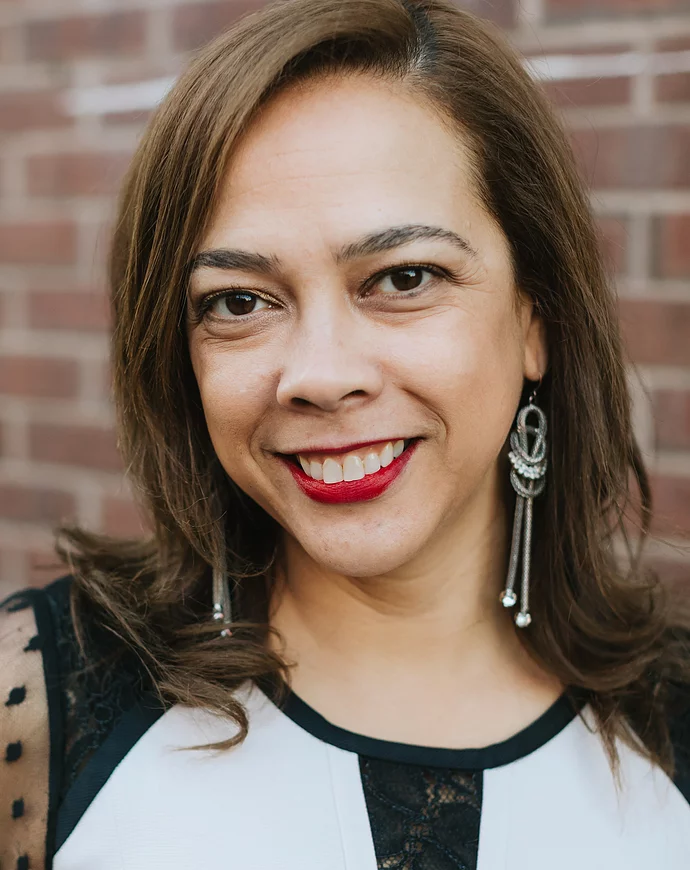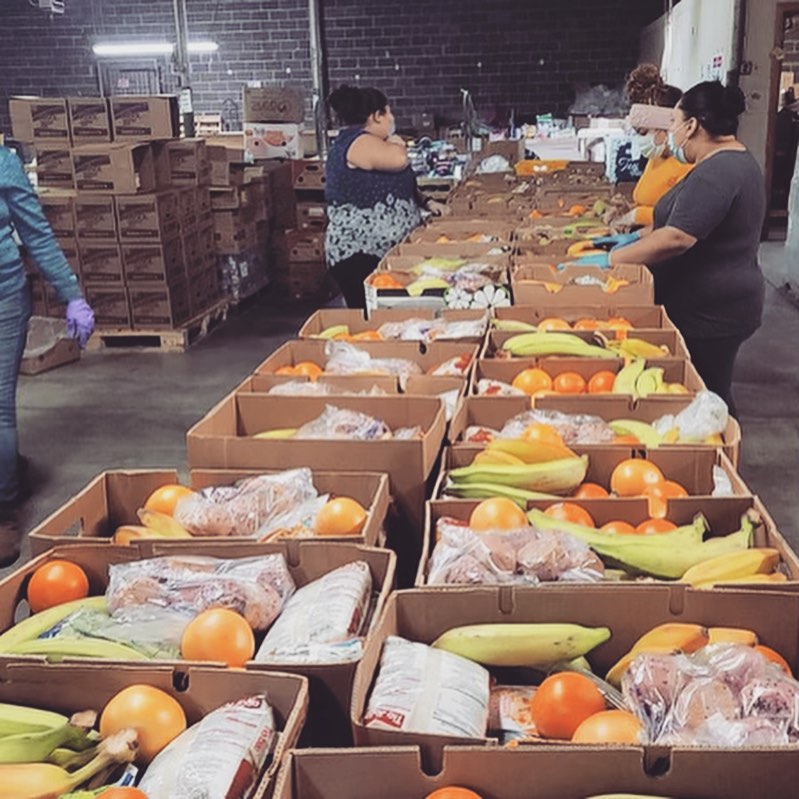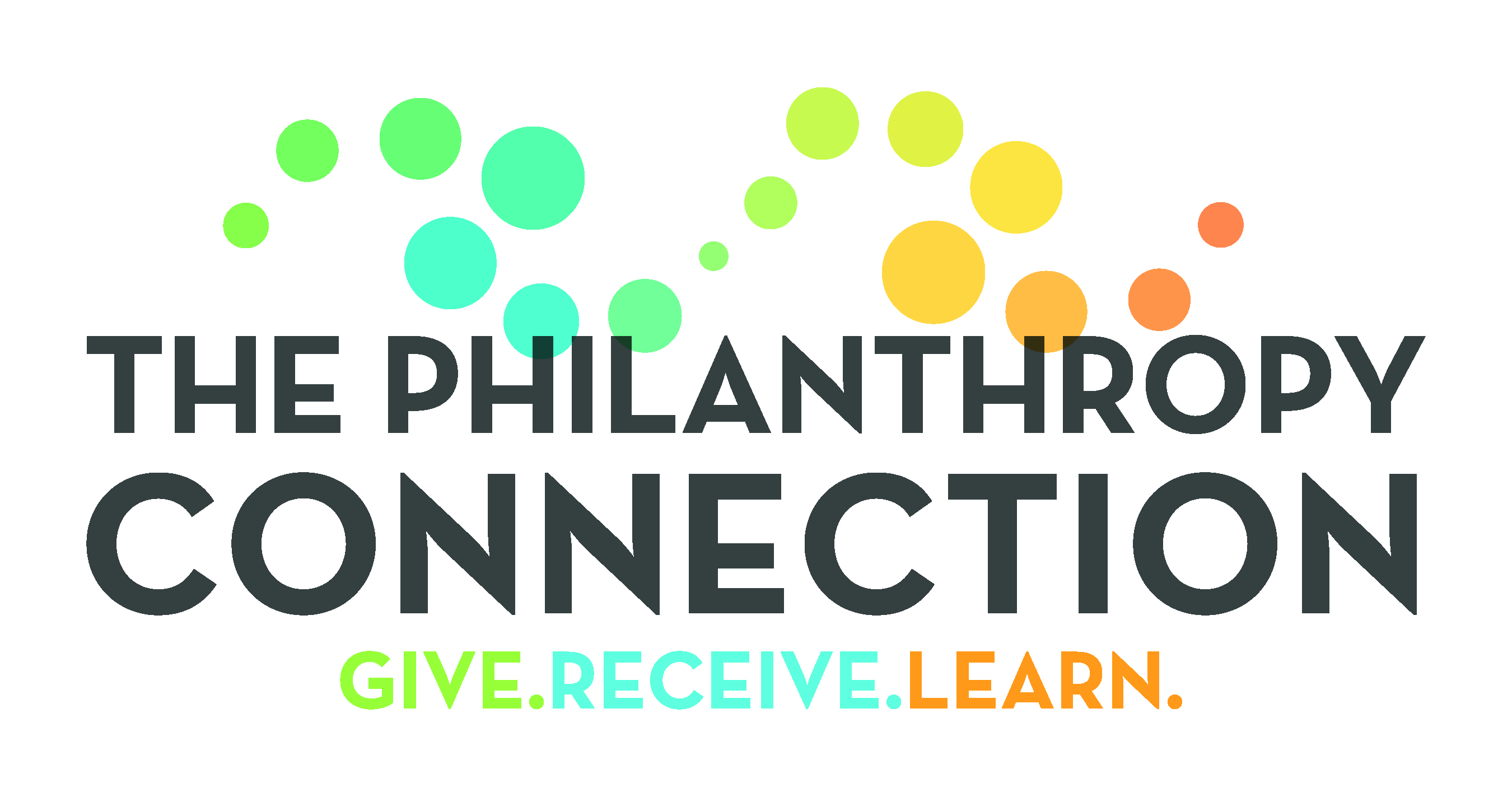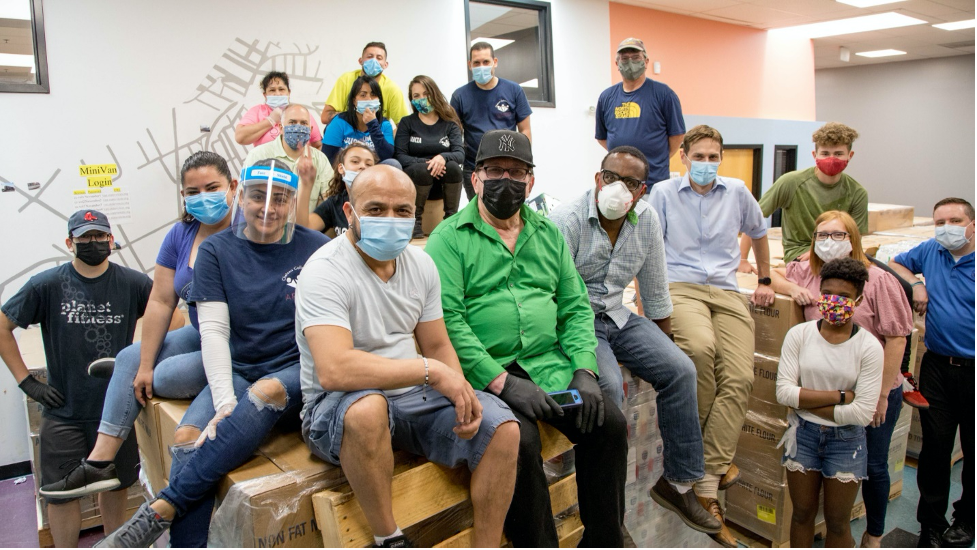The Interview with Dinanyili Paulino, COO

“We don’t get a lot of sleep, Gladys and I,” Dinanyili Paulino, the Chief Operating Officer of La Colaborativa (LC), tells me with a laugh as we talk about what it’s been like for her and the Executive Director to be on the frontlines of the pandemic and serving our Latinx neighbors in Chelsea, East Boston, Everett, Malden, Revere, and beyond. “But it’s what’s needed right now. What gives me strength is to talk to the women we serve about the role we are playing in their lives, to know that it is making a difference. I ask myself, ‘Are we providing enough food? This family is being evicted but they have been living in squalid conditions, and is that fair? What kind of legislation can we push so that landlords can treat their tenants with respect and dignity?’ Our mission is economic mobility, but right now we must fight for economic stability.”
For a community that continues to be the epicenter of COVID in the state and is also experiencing one of the deepest economic fallouts – where unemployment has spiked to 24% – these past 11 months have been an all-hands on deck emergency.
Before the pandemic, LC was known as a place fiercely committed to the empowerment and economic mobility of the Latinx community, especially for women, mothers, and children. It developed a broad range of innovative programming around skills training, job placement, tenants’ rights advocacy, workers’ rights, citizenship services, and youth development. These programs enabled Latinx immigrants to get good jobs that supported their families so they could realize the “American Dream.”
“What makes us an amazingly diverse and thriving community is being threatened,” Dini says. “Housing has always been important to us and our community, and we have always had challenges. But with COVID, it is making it much, much worse for families. We have landlords who are violating housing codes and housing laws. We are suffering from overcrowding. And on top of all that, many families don’t have food or money for basic needs. For our single moms who might be able to get a job, they can’t because they have young ones at home.”
Chelsea is a community with a 70% Latinx population and 80% of residents are essential workers who don’t have the privilege of working from home to stay safe. Among many challenges, it suffers from overcrowding, where multiple families rent rooms in small apartments and share the kitchen and bathroom. Many residents don’t have access to formal healthcare and have tenuous legal situations as undocumented immigrants so they are reluctant to engage with official institutions. But despite these challenges, renowned Harvard economist Raj Chetty identified Chelsea, Everett, Revere, and Malden as “opportunity bargains” – places that are generally affordable where the poorest Black and Latino children have found pathways to upward mobility. It was an astonishing realization to the researchers and something our state should make sure to understand, protect, and enhance.
So, how is LC balancing its mission to create lasting, structural change for the Latinx community with today’s urgent need to keep its clients fed, housed, and healthy? Dini explains that they launched several new programs as part of their “COVID-19 Emergency Response” initiative. You may have read about the entirely new food pantry operation that serves 8,000 households a week and enables staff to understand what else its clients may need, whether it be a coat, hat, or emergency shelter for domestic abuse. It is also providing direct financial assistance to families in need; working with local officials to prevent displacement and keep families housed; increasing access to testing through a partnership with MGH; taking over 200 calls a day through a bilingual community hotline; and creating local jobs through the food pantry operation. Simply addressing the community’s basic needs is a herculean effort, but that is only part of LC’s mission. To advance economic opportunity and foster empowerment within the Latinx community, a foundational goal of the nonprofit, it has transitioned all its existing skills development programming to a virtual format as well as engaging in new partnerships and programming.
 “We are stretching our dollars thin and are pivoting to expand our workforce development department,” Dini explains. “We are starting a skills camp for people who need to pivot from food and hospitality to other industries, and we are recruiting companies to hire them.” She then describes a new regional partnership that has just come together with various community organizations and the cities of Chelsea, Revere, and Winthrop to implement a shared Workforce Action Plan to get residents new skills and back into the job market. LC is also continuing to advocate for better access to vocational training for Chelsea youth so they have bright futures.
“We are stretching our dollars thin and are pivoting to expand our workforce development department,” Dini explains. “We are starting a skills camp for people who need to pivot from food and hospitality to other industries, and we are recruiting companies to hire them.” She then describes a new regional partnership that has just come together with various community organizations and the cities of Chelsea, Revere, and Winthrop to implement a shared Workforce Action Plan to get residents new skills and back into the job market. LC is also continuing to advocate for better access to vocational training for Chelsea youth so they have bright futures.
Like its clients who often have to work two and three jobs to build a better life, LC hustles to do everything it can to make the system better, more socially just, and welcoming for its Latinx community.
“When I started at LC, this is not at all what I expected,” Dini admits. “But I am learning so much. And I have been amazed by all of the people who have stepped in to help as donors, volunteers, and mentors – including the TPC community! With all of the struggles we have faced and all of the challenges, there have been angels along the way. Even our residents have supported us. Last week a man brought us a can of tuna and said, ‘I don’t have much, but here’s how I can help.’ It fills my heart.”
BRIGHT SPOTS OF 2020 FROM LA COLABORATIVA
“There are no words to express how grateful we are to everyone who has supported LC in one way or another this year. These accomplishments are proof that we are unstoppable when we stand together. On behalf of the LC family, we wish you and yours a Happy New Year! We look forward to better days ahead for our community in 2021.”
This year LC was able to:
- Raise over $500,000 from more than 1,500 individual donors for the Whatever it Takes campaign that ran from November 1 to the end of year;
- Establish a permanent, professional, and daily food pantry serving over 8,000 households each week after its humble beginnings on Gladys’ front porch;
- Distribute over $622,000 in direct cash assistance to hundreds of families and their children so they could afford critical care items like medication;
- Create more than 250 new jobs for community members, at a time when Chelsea’s unemployment rate rose to 24%;
- Support thousands of families through its Rapid Response Pandemic Initiative, which provides legal aid, bilingual case management, and help in accessing public benefits;
- Fully transition its English and Citizenship classes online and establish a laptop lending library to close the community’s digital divide;
- Recruit hundreds of new volunteers, in person and online;
- Add five new full-time staff; and, finally,
- Change its name to better reflect the work it does today and how it plans to continue empowering the Latinx immigrant community for years to come.
HOW TO HELP
Donate! (online at ActBlue)
- $18 = 1 bag of groceries
- $54 = 3 bags of groceries
- $108 = 6 bags of groceries
- $252 = 14 bags of groceries
- $504 = 28 bags of groceries
- $1,008 = 56 bags of groceries
Volunteer
- Become an ESOL conversation partner at a time that works for you.
- Review resumes and conduct mock interviews.
- Support RAFT applications so families can stay housed (RAFT: Residential Assistance for Families in Transition).
- Support unemployment applications.
- Organize a food drive in your community (baby supplies are especially needed).
- Housing law expertise is always needed!
Talk to your state legislators about supporting legislation that would:
- Increase funding for Gateway Cities like Chelsea.
- Increase funding for housing, like the RAFT program.
- Allow tenants to have pro bono legal support through Right to Counsel legislation.
- Protect tenants from eviction through a moratorium or rent cancellation.
- Allow all residents, regardless of immigration status, to obtain a driver’s license through the Family Mobility Act.

